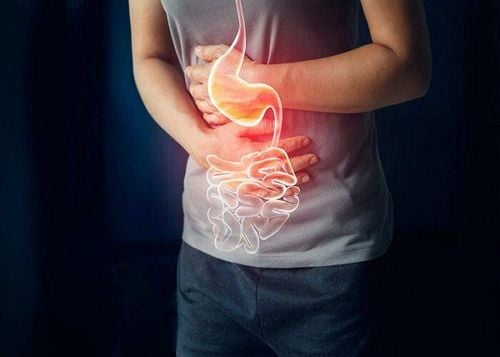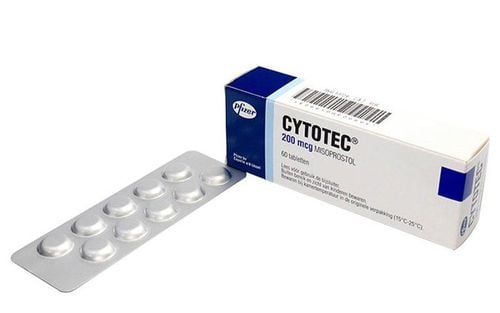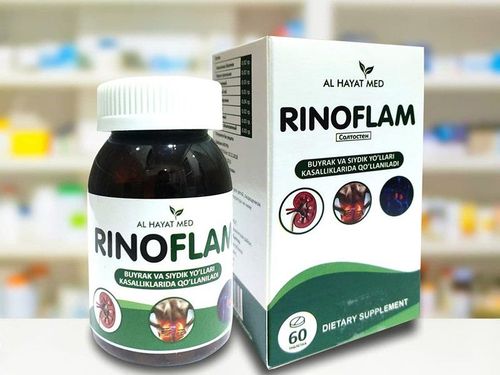This is an automatically translated article.
The article is professionally consulted by Specialist Doctor I Tran Quoc Vinh - Emergency Doctor - Department of Resuscitation - Emergency - Vinmec Nha Trang International General Hospital.
There are many reasons why you have an upset stomach and the treatment will depend on the cause. Certain foods can provide temporary relief from symptoms, helping you to feel better faster. So what should people with stomach pain eat?
1. Ginger: Relieves Nausea and Vomiting
Nausea and vomiting are common symptoms of an upset stomach. Ginger - an edible root, fragrant and bright yellow, is often used as a natural remedy for both of these symptoms. Ginger can be eaten raw, cooked, soaked in hot water or used as a spice. Either way, ginger is effective.
It is theorized that ginger modulates nervous system signaling in the stomach and speeds up gastric emptying, thereby helping to reduce nausea and vomiting. Ginger is also a natural remedy for discomfort for pregnant women, those undergoing surgery, chemotherapy or motion sickness. The composition of ginger root contains substances such as Oleoresin, Tecpen with high antibiotic activity. It has antiseptic, anti-inflammatory effects and is considered a natural antibiotic to help protect human health.
As a daily drink, processing into ginger tea and sipping every morning is extremely effective for people with stomach pain. Ginger tea helps stimulate digestion, improve the absorption of nutrients for the body and effectively solve stomach problems. Maintaining the habit of drinking ginger tea is a very good practice that brings many benefits to human health. Although considered safe, it is not recommended to take more than 5 grams of ginger per day to limit heartburn and indigestion. flow may occur.
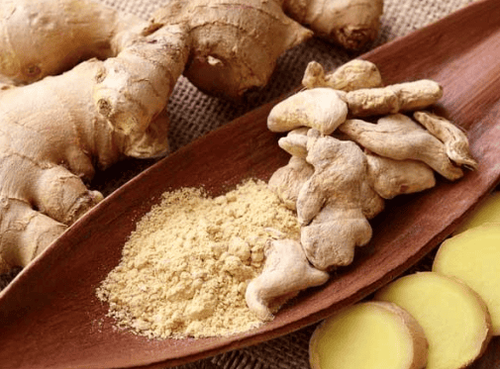
2. Chamomile: Relieves Vomiting and Soothes Irritable Bowel
Chamomile - an herbal plant with small white flowers, is a traditional remedy for stomach problems. Chamomile flowers can be dried and made into a tea, or an extract added to a supplement. Chamomile - in combination with many other herbs, is a commonly used remedy for stomach and intestinal pain. Chamomile is best known for its use in reducing stress and anxiety and helping to sleep better. In addition, it also has the effect of soothing digestive disorders in the stomach.Historically, chamomile has been used for a variety of intestinal problems, including belching, indigestion, diarrhea, nausea and vomiting, as well as colic in infants. One small study also found that chamomile supplementation reduced the severity of vomiting after chemotherapy treatment in cancer patients.

3. Mint: Relieves IBS Symptoms
In some people, stomach upset is caused by irritable bowel syndrome (IBS) - a chronic intestinal disorder that can cause pain, bloating, constipation, and diarrhea. Although irritable bowel syndrome is often difficult to manage, studies show that peppermint, especially when consumed as an essential oil, has the ability to limit discomfort.
Peppermint oil has the ability to soothe, effectively numb, does not increase calcium ions that cause spasms, helps the muscles in the digestive tract to relax. This mechanism reduces the risk of cramping, bloating, and nausea. It also helps users avoid indigestion and stomach upset.
Taking menthol capsules daily for at least 2 weeks can significantly reduce stomach pain, bloating, and diarrhea in adults with irritable bowel. Peppermint oil relaxes the muscles in the digestive tract, reducing the severity of painful intestinal spasms. However, the therapeutic effects of mint leaves or tea are not well established.
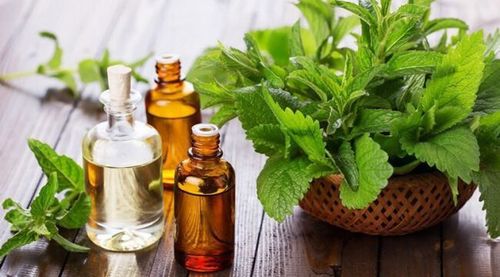
4. Licorice: Relieves Indigestion and Prevents Stomach Ulcers
Licorice is a popular remedy for indigestion and can also prevent the pain of peptic ulcers by inhibiting gastric acid secretion and creating a protective film in the stomach lining. Today, licorice root is commonly taken as a deglycyrrhizinated licorice (DGL) supplement. DGL no longer contains glycyrrhizin - a natural ingredient that causes fluid imbalance, high blood pressure and low potassium levels when consumed in large quantities. Studies show that DGL calms stomach pain and discomfort due to inflammation of the stomach lining, while increasing mucus production to protect tissues from stomach acid. This use is especially useful for people with stomach pain caused by excessive acid or reflux.Supplementing with licorice extract can also relieve pain and indigestion caused by H. pylori bacteria, help eliminate bacteria and even promote the healing of stomach ulcers. Overall, licorice is an effective herb that soothes the gut, helping to reduce inflammation and infection that contribute to stomach upset.
5. Flaxseed: Relieves Constipation and Stomach Pain
Flaxseed is also on the list of people with stomach pain should eat to relieve pain. This is a small fibrous seed, which can help regulate bowel movements, relieve chronic constipation and colic when consumed in the form of flaxseed powder or oil. In addition to good effects for digestion, flax seeds are also good for the heart, boost immunity, treat symptoms of respiratory and urinary infections, reduce the risk of osteoporosis and cancer. Adults with constipation should take it. about 4 ml of flaxseed oil/day for 2 weeks to increase bowel movements and stool consistency. Other benefits of flaxseed include: preventing stomach ulcers and reducing intestinal spasms (but more research is still needed).See more articles: Flaxseed oil: Uses, dosage, side effects

6. Pectin Supplement: Prevents Diarrhea, Indigestion and Stomach Pain
Pectin - a type of plant fiber found in apples and citrus (citrus) fruits, may promote the growth of healthy gut bacteria. Pectin is commonly isolated from fruit and sold as a dietary supplement.
When stomach problems or wrong foods cause diarrhea, pectin supplements can help speed up recovery. Humans cannot digest this substance, so it stays in the intestinal tract to thicken stools and prevent diarrhea.
People often experience unpleasant symptoms such as heartburn, bloating or abdominal pain due to an imbalance of bacteria in the gut. Pectin relieves stomach upset by promoting the growth of good bacteria in the digestive tract.
7. Light Carbohydrates: Easier Tolerance
Starchy foods, low in fiber such as rice, oatmeal, biscuits and toast are often recommended for the question of what to eat with an upset stomach.
Although there is little evidence that they actually help with symptoms, many people report that they are more palatable and easier to digest when taking these foods when they are sick or feeling unwell.
However, it is still advisable to diversify the diet as soon as possible. Limit eating too much starch to avoid lack of vitamins and minerals - essential elements for the body's recovery.
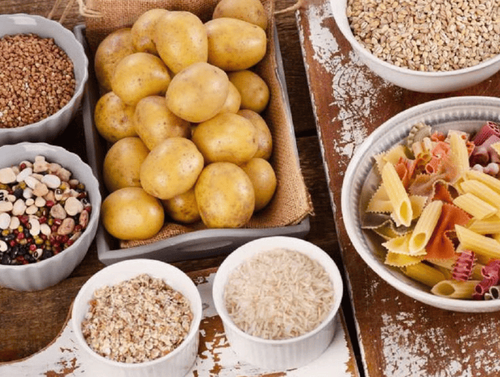
8. Stomach pain should not eat?
In addition to understanding what fruit people with stomach pain should eat, patients also need to pay attention to avoid foods such as:
Spicy foods: Your digestive system may have to work harder to digest food. spicy seasoning, and that can make stomach pain worse, sour foods contain a lot of acid, so increase the pH of the stomach, in addition to direct irritation causing burning also stimulate increased secretion gastric juice makes stomach ulcers worse. Raw fruits and vegetables: While great for healthy people, when you have an upset stomach, fiber can make things worse. It's best to wait until you feel better, then start with small portions of cooked vegetables and juices; Fried foods: These foods have a lot of oil and fat, so they are harder to digest. Fried foods are not good for you even if you are healthy, and they can make your stomach upset; Triggers: People with stomach upset should also be careful with acidic foods like tomatoes, or carbonated drinks. In addition, it is also necessary to minimize stress at work to keep the digestive and immune systems healthy, ready to fight unpleasant problems in the stomach.
Answering the question "What should I eat for stomach pain?", doctors said there are many foods that will help relieve symptoms. For example, herbs like ginger, chamomile, mint, and licorice have natural stomach-soothing properties, while consuming light carbohydrates can help you feel better when you're upset.
Please dial HOTLINE for more information or register for an appointment HERE. Download MyVinmec app to make appointments faster and to manage your bookings easily.
Reference source: webmd.com; healthline.com





